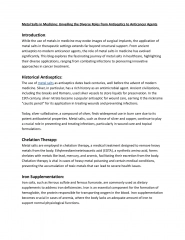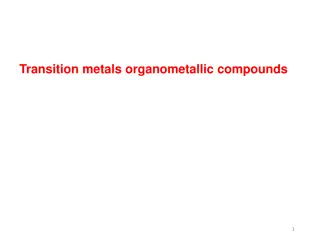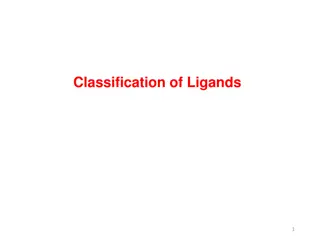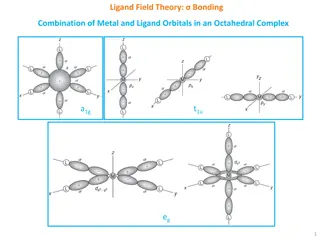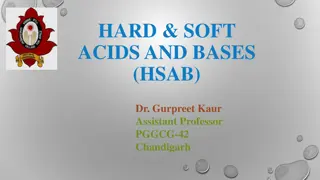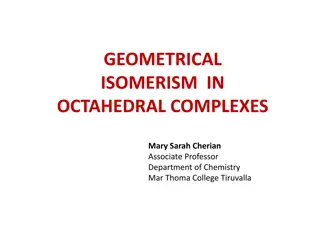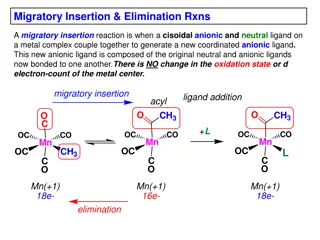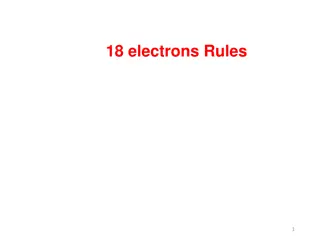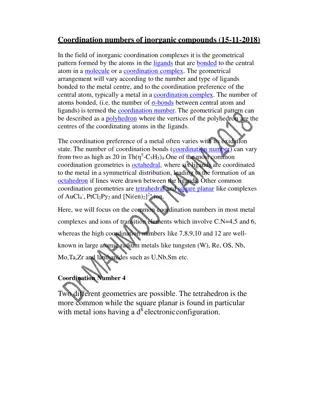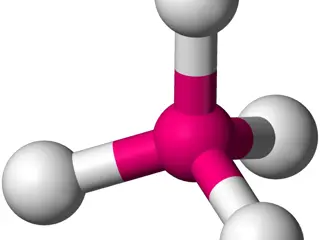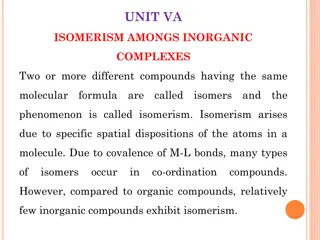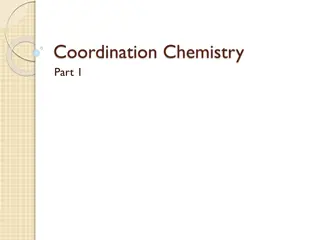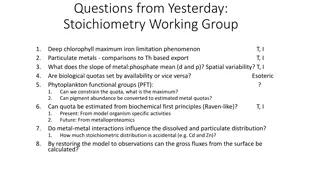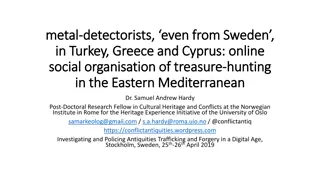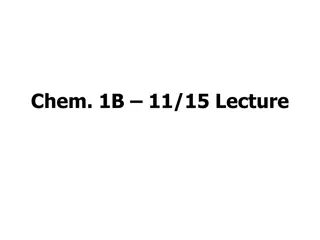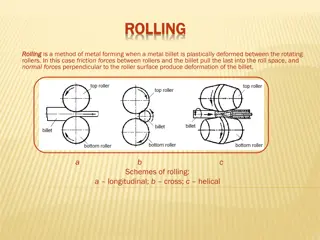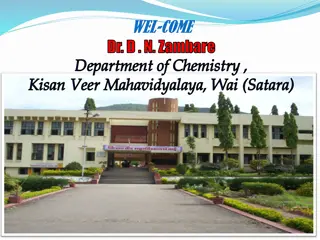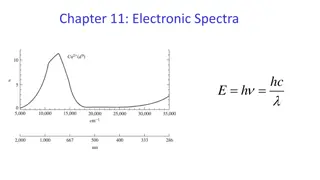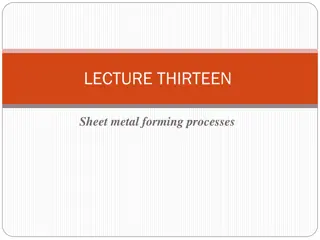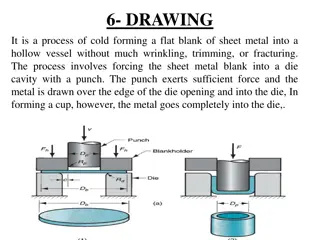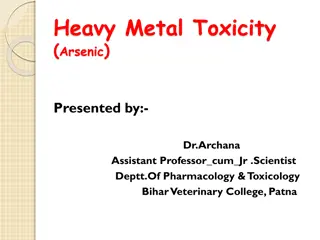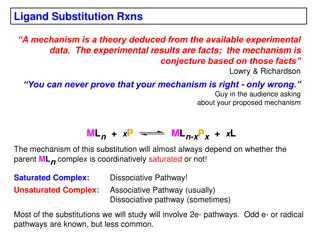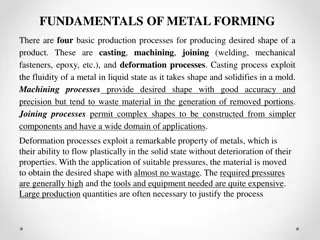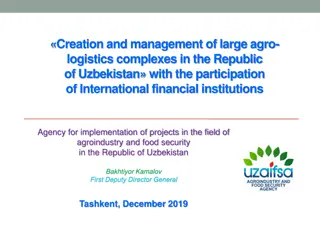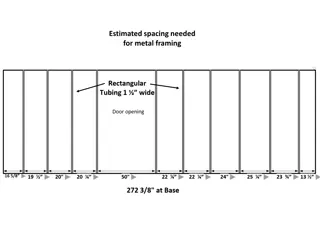Metal Salts in Medicine_ From Antiseptics to Anticancer Agents
While the use of metals in medicine may evoke images of surgical implants, the application of metal salts in therapeutic settings extends far beyond structural support. From ancient antiseptics to modern anticancer agents, the role of metal salts in medicine has evolved significantly. This blog expl
9 views • 3 slides
Scrap Metal in Clayton That Offers Expert Collection & Transport Services
JJ Scrap Metals, located in Clayton, offers professional scrap metal collection and transportation services. With a team of experts boasting extensive industry knowledge, we assure you of maximising returns for your metals. Our goal is to provide efficient and reliable services, making it convenient
5 views • 4 slides
Organometallic Chemistry (CHEM 42 1)
Organometallic chemistry delves into compounds with carbon-metal bonds, merging concepts from inorganic and organic chemistry. The field encompasses diverse compounds like ferrocene and tris(triphenylphosphine)rhodium carbonyl hydride, with nomenclature based on naming organic groups and adding meta
1 views • 13 slides
Transition Metals Organometallic Compounds Overview
Transition metals bonded with organometallic compounds like metal alkyls, aryls, and hydrides are common in chemistry. Ligands are crucial for stabilizing these complexes, with carbon-based ligands exhibiting diverse binding modes based on the metal's hybridization state. Preparation methods for tra
1 views • 25 slides
Crystal Field Theory in Transition Metal Complexes
Crystal Field Theory (CFT) explains the colors and magnetic properties of transition metal complexes. It focuses on the energy changes in d-orbitals of metal ions caused by surrounding ligands. This theory, developed in 1929, provides insights into the bonding interactions in complex compounds. The
10 views • 44 slides
Ligands and Metal Carbonyl Complexes: A Comprehensive Overview
Explore the classification of ligands in metal complexes, including alkyl, aryl, and carbonyl ligands. Learn about the unique properties of carbonyl ligands, their preparation methods, and the molecular orbital diagram illustrating CO-metal bonding interactions.
5 views • 35 slides
Maximise Returns on Metal Recycling with Affordable Scrap Metal Prices
In today's eco-conscious world, JJ Scrap Metals stands out as a beacon of sustainability and profitability in the scrap metal industry. With a proud history of serving areas like Moorabbin, Dandenong South, Pakenham, and beyond, we're not just any scrap metal collector but your partner in ensuring t
3 views • 5 slides
Metal wall art
Elevate your living space with \"TheOnlyPlanetEarth\" metal wall art decor, curated to bring a touch of modern elegance to your home. Perfect for living rooms, this exquisite piece is available in Singapore, Indonesia, Malaysia, Dubai, Saudi Arabia, and Europe. Our services include outdoor metal art
2 views • 1 slides
Get Fair Scrap Metal Prices in Melbourne at JJ Scrap Metals
Scrap metal can negatively impact the environment if not managed properly, necessitating careful handling and recycling. \nAt JJ Scrap Metals, we have the expertise to recycle tons of used metals, including copper, aluminium, brass, lead, batteries, iron, wrecked cars, and vehicles. \nAs Melbourne's
1 views • 5 slides
Metal Gates and Fence Installation Services
Metal gates are an excellent choice for enhancing the security and aesthetic appeal of your property in Redmond. At Electric Metal gates in Redmonds, we specialize in the design, fabrication, and installation of high-quality metal gates tailored to meet your specific needs. Our metal gates come in v
4 views • 3 slides
Organometallic Chemistry III: Transition Metal Complexes and Homogeneous Catalysis
Explore the reactivity of transition metal complexes, including bond metatheses and various reactions. Learn about orbital considerations, synthesis, and spectroscopic properties of organometallic complexes. The course covers basics from AC1, focusing on ligands, electron counting, and MO diagrams.
5 views • 8 slides
Metal Roof Painting of Factories At Commercial Painting Services
Commercial Painting Services has years of experience dealing with metal roof painting clients that have neglected their metal roof maintenance. \/\/ \/metal-roof-painting-michigan-ohio-indiana
1 views • 13 slides
Understanding Ligand Field Theory in Octahedral Complexes
Ligand Field Theory explains the bonding interactions between metal and ligand orbitals in octahedral complexes. This theory involves the combination of metal and ligand orbitals to form molecular orbitals, leading to specific electronic configurations. The overlap of metal and ligand group orbitals
1 views • 10 slides
Understanding Crystal Field Theory in Chemistry
Crystal Field Theory (CFT) explains how electron orbital degeneracies, particularly d or f orbitals, are affected by a static electric field generated by neighboring anions. In CFT, the metal ion is considered positive while ligands are negative charges, leading to attractive and repulsive forces af
0 views • 13 slides
Understanding Hard and Soft Acids and Bases (HSAB Principles) by Dr. Gurpreet Kaur
Delve into the world of Hard and Soft Acids and Bases (HSAB) with Dr. Gurpreet Kaur as she explains the characteristics of hard and soft acids, Pearson's HSAB principle, applications such as predictions of coordination in complexes, poisonings of metal catalysts, and the classification of acids and
2 views • 17 slides
Understanding Enemark-Feltham Notation in Iron-Nitrosyl Complexes
Iron-Nitrosyl complexes are redox non-innocent, with NO exhibiting multiple redox states. Enemark-Feltham Notation helps in determining metal-ligand interactions and oxidation states. Detailed information on NO ligands, bonding characteristics, and methods for analyzing iron-NO systems are discussed
0 views • 6 slides
Role of Transition Metal Complexes in Cancer Treatment
Transition metal complexes, such as platinum (II) compounds like cisplatin and carboplatin, have shown significant efficacy in treating various types of cancers. These complexes offer a promising approach for combating cancer with reduced side effects. Additionally, new generation compounds like pic
0 views • 15 slides
Understanding Metal Toxicity: Risks, Detection, and Impact on Health
Metal toxicity is a growing concern affecting many individuals today, with 41% of Delhi & NCR population testing positive for severe heavy metal toxicity. This survey by Daivam Wellness aims to create awareness about the dangers of metal toxicity and its impact on health, including diseases such as
0 views • 7 slides
Geometrical Isomerism in Octahedral Complexes: A Comprehensive Overview
Geometrical isomerism in octahedral complexes is a fascinating phenomenon arising from different geometric arrangements of ligands. This type of isomerism is prevalent in coordination numbers 4 and 6, leading to two main types of geometric isomers. Examples of cis-trans and mer-fac isomers in MA2B4
5 views • 10 slides
Insights into Migratory Insertion and Elimination Reactions in Metal Complexes
Migratory insertion in metal complexes involves the coupling of a cisoidal anionic and neutral ligand to form a new coordinated anionic ligand without changing the metal center's oxidation state or d-electron count. This process requires cisoidality between the reacting ligands and a vacant coordina
0 views • 19 slides
Understanding the 18-Electron Rule in Transition Metal Organometallic Compounds
The 18-electron rule governs the stability of transition metal organometallic compounds by requiring the sum of metal d electrons and ligand-supplied electrons to be 18. This rule highlights the importance of electron count and ligand characteristics in forming stable complexes. Key concepts include
0 views • 15 slides
Overview of Chelating Agents in Pharmacology
Chelating agents are organic compounds that bind with heavy metal ions to form non-toxic complexes excreted in urine. Dimercaprol, Succimer, Edeta, Calcium disodium edetate, Penicillamine, and Desferrioxamine are key examples used in treating metal poisoning by forming stable complexes with metals f
0 views • 12 slides
Coordination Numbers in Inorganic Compounds: Geometries and Structures
In inorganic coordination complexes, the coordination number refers to the number of atoms bonded to the central atom. Common geometries include octahedral, tetrahedral, and square planar, depending on the type and number of ligands. Transition metal complexes exhibit different coordination numbers
2 views • 8 slides
Crystal Field Theory and Color Exhibited by Coordination Compounds
Crystal Field Theory (CFT) explains the colors exhibited by coordination compounds based on the absorption of light and electron transitions in d-orbitals. The theory describes how ligands interact with transition metal ions, causing the d-orbitals to split in energy levels. This split results in th
0 views • 30 slides
Isomerism in Inorganic Complexes: A Comprehensive Overview
Isomerism in inorganic complexes is a fascinating phenomenon arising from the specific spatial arrangements of atoms within molecules. This article delves into the types of isomerism found in coordination compounds, such as structural isomerism and stereoisomerism. The importance of studying isomers
0 views • 67 slides
Insights into Coordination Chemistry Elements and Complexes
Transition elements with d or f electrons possess unique properties, play crucial roles in biological processes, and form colorful complexes with ligands. Occurring widely in nature, these elements have varied oxidation states and coordination numbers. Werner's formulation sheds light on primary and
0 views • 41 slides
Insights on Biogeochemical Processes and Metal Interactions in Marine Environments
Delve into the intricate relationships between metals, stoichiometry, and biological quotas in marine ecosystems. Explore the impact of metal interactions on biogeochemical provinces, resource supply stoichiometry, and the constraints they impose on marine biota. Uncover how deep chlorophyll maxima,
0 views • 5 slides
Metal Detectorists and Antiquities Laws in Eastern Mediterranean
Post-Doctoral Research Fellow Dr. Samuel Andrew Hardy explores treasure hunting and metal detecting by detectorists from Sweden in Turkey, Greece, and Cyprus. The legal frameworks regarding metal detecting and excavation of archaeological sites differ in Cyprus, Greece, and Turkey. While unlicensed
0 views • 11 slides
Understanding Coordination Complexes and Transition Metals
Today's lecture covers transition elements, coordination complexes, ligand types, geometries, naming, isomers, and bonding in coordination complexes. Transition metals form coordination complexes with metal ions, ligands, and counter ions. The types of ligands include monodentate and bidentate ligan
0 views • 24 slides
Methods of Metal Forming: Rolling and Related Techniques
Rolling is a metal forming method that involves shaping metal billets between rotating rollers, utilizing friction and normal forces to deform the material. The process includes sheet rolling, slabbing, various sections of rolled metal, and different equipment used in metal forming. Other methods di
0 views • 5 slides
Understanding Chelation Chemistry: Structural Requirements, Ligands, and Applications
Chelation chemistry involves the formation of specific complexes known as chelates, characterized by ligands that coordinate with a central metal ion. This article explores the structural requirements for chelate formation, the role of chelating agents like EDTA and DMG, and the difference between m
0 views • 27 slides
Understanding Electronic Spectra and Transition Metal Complexes
Explore the world of electronic spectra, absorption bands, and transition metal complexes through various diagrams and explanations covering topics like d-d transitions, free ions, microstates, and charge transfer transitions. Discover the reasons behind the coloring of octahedral compounds despite
0 views • 22 slides
Overview of Sheet Metal Forming Processes
Products made of sheet metals are prevalent in consumer and industrial applications, encompassing items like beverage cans, cookware, car bodies, and more. The primary sheet-metal processes include cutting, bending, and drawing, each serving different purposes in shaping sheet metals. Cutting operat
0 views • 6 slides
Understanding Metal Spinning Process and Techniques
Metal spinning, also known as spin forming or metal turning, is a metalworking process that involves shaping a disc or tube of metal by rotating it at high speed. This process does not involve material removal but rather the forming of sheet material over an existing shape. Hot spinning is a variati
0 views • 28 slides
Metal Drawing Process for Creating Hollow Vessels
Metal drawing is a cold forming process that transforms a flat sheet metal blank into a hollow vessel without wrinkles or fractures. By applying force with a punch, the metal is drawn into a die cavity to shape the blank into a cup-like form. This process involves setup similar to blanking but with
0 views • 19 slides
Understanding Arsenic Toxicity: Mechanisms, Effects, and Treatment
Arsenic toxicity is a significant concern due to its presence in various sources like pesticides and industrial activities. This heavy metal can lead to severe health issues by interfering with normal physiological functions. Chelating agents play a crucial role in managing arsenic poisoning by form
0 views • 13 slides
Understanding Ligand Substitution Reactions in Metal Complexes
Ligand substitution reactions in metal complexes involve the replacement of one ligand with another, impacting the coordination around the metal center. The mechanism of these reactions, associative or dissociative, is influenced by factors like coordination saturation and electron count. Experiment
0 views • 20 slides
Basics of Metal Forming Processes
Metal forming processes play a crucial role in shaping products, with casting, machining, joining, and deformation being the primary methods. Each process has its advantages and limitations, catering to different needs for accuracy, material wastage, complexity, and production quantities. Understand
0 views • 22 slides
Implementation of Large Agro-Logistics Complexes in Uzbekistan
The Republic of Uzbekistan is focusing on creating and managing large agro-logistics complexes to enhance food security and agribusiness development. Government programs and international financial institutions are instrumental in funding and implementing these projects, aiming to increase agricultu
0 views • 13 slides
Comprehensive Metal Framing and Building Support Specifications
Detailed images and information on estimated spacing for metal framing, metal framing needed for the third floor barrel piece, third floor barrel section and building wall metal support beams, and specifications for window panel cutouts.
0 views • 4 slides
